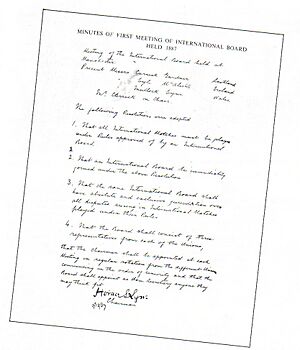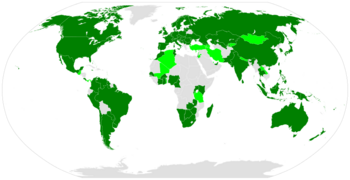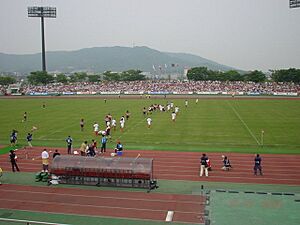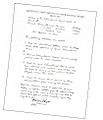World Rugby facts for kids
 |
|
| Formation | 1886 (as the International Rugby Football Board) |
|---|---|
| Type | International sport federation |
| Headquarters | Dublin, Ireland |
|
Region served
|
Worldwide |
|
Membership
|
113 member unions 17 associated unions |
|
Official languages
|
|
|
Chairman
|
Brett Robinson |
|
Vice-Chairman
|
Jonathan Webb |
|
CEO
|
Alan Gilpin |
| Affiliations | International Olympic Committee |
|
Formerly called
|
International Rugby Football Board (1886-1998) International Rugby Board (1998-2014) |
World Rugby is the main organization that runs the sport of rugby union around the world. It's like the boss of rugby! World Rugby organizes the Rugby World Cup every four years. This is the biggest and most famous rugby competition. They also arrange other international games, like the World Rugby Sevens Series and the World Under 20 Championship.
World Rugby's main office is in Dublin, Ireland. It has 133 national rugby groups as members. Each country's rugby group must also be part of one of the six bigger regional groups. These regions cover Africa, North America, Asia, Europe, South America, and Oceania.
World Rugby started way back in 1886. It was first called the International Rugby Football Board (IRFB). It was created by rugby groups from Scotland, Wales, and Ireland. England joined them a few years later in 1890. Over time, more countries joined, like Australia, New Zealand, and South Africa in 1949. The organization changed its name to the International Rugby Board (IRB) in 1998. Then, in November 2014, it became World Rugby. In 2009, the International Olympic Committee (IOC) decided to include rugby sevens in the 2016 Summer Olympics.
Contents
History of World Rugby
Before 1885, England, as the country where rugby started, made all the rules. But after a disagreement in a game between Scotland and England in 1884, the other countries felt they needed a say. Scotland, Ireland, and Wales decided to create an international group to agree on the rules. They met in Dublin in 1886, but didn't make any official rules yet.
On December 5, 1887, leaders from the Irish, Scottish, and Welsh rugby groups met in Manchester. They wrote down the first four main ideas for the International Rugby Football Board. England didn't want to join at first. They felt they should have more power because they had more rugby clubs. England also didn't want to accept the IRFB as the official rule-maker. So, the IRFB members decided not to play against England until they joined. This meant no games were played against England in 1888 and 1889. Finally, in 1890, England joined the IRFB. They got six seats on the board, while the other groups had two each. In the same year, the IRFB wrote the first international rules for rugby union.
In 1893, the IRFB faced a big problem called the "Great Schism." This was about whether players should be paid. When working-class men started playing rugby in Northern England, some clubs began paying them for the time they missed from work on Saturdays. This caused a big debate. Many clubs in Lancashire and Yorkshire warned that if players were punished for being paid, they would leave the union. This argument led 22 top clubs to form a new group called the Northern Rugby Football Union. The rules of the game quickly became different between the two groups. The northern group's game eventually became known as rugby league football.
Over the years, the number of seats England had on the IRFB changed. In 1911, it went from six to four. In 1948, the rugby groups from Australia, New Zealand, and South Africa joined, each getting one seat. England's seats were then reduced to two, the same as the other founding nations. In 1958, the three Southern Hemisphere groups each got a second seat. Many more countries joined later, including France in 1978, and Argentina, Italy, and the USA in 1987. By 1999, over 80 new members had joined. In 2016, Georgia, Romania, and the USA got one vote each on the Council. Argentina, Canada, and Italy also got a second vote. The six regional groups also received an extra vote.
After the events of 2022, World Rugby stopped Russia from playing in international and European rugby games. The Rugby Union of Russia was also suspended from World Rugby.
Rugby World Cup History
In the 1960s, two Australians, Harold Tolhurst and Jock Kellaher, suggested a World Rugby Championship. But the IRFB said no. Later, in 1983 and 1984, Australia and New Zealand's rugby groups each suggested hosting such a tournament. The next year, the board decided to study if it was possible. A year later, a meeting in Paris led to a vote. The South African Rugby Board's vote was very important. They voted yes, even though they knew they couldn't play because of rules against their country's apartheid policies. After this, England and Wales changed their votes, and the idea won 10 to 6. This led to the creation of the Rugby World Cup.
World Rugby Member Unions
As of June 2024, World Rugby has 113 full member unions and 17 associate member unions.
Becoming a member of World Rugby is a four-step process:
- A rugby group must first ask to become an associate member of its regional group.
- After meeting all the rules, including being an associate member for one year, the group becomes a full member of its regional group.
- After steps 1 and 2, and being a full member of a regional group for two years, the group can then apply to become an Associate member of World Rugby. As an associate member, they can play in World Rugby-funded tournaments but not the Rugby World Cup.
- After two years as an associate member of World Rugby, the group can then apply to become a Full Member.
Regional Unions Six regional groups, one for each continent, work with World Rugby. They help grow rugby union and Rugby sevens around the world. Not all members of these regional groups are members of World Rugby. Below is a list of member and associate unions and their regional groups, with the year they joined World Rugby. Associate unions are written in italics.
Africa Rugby Unions
There are 21 World Rugby members and 6 World Rugby associates in Africa:
 Algeria (2021)
Algeria (2021) Botswana (1994)
Botswana (1994) Burkina Faso (2020)
Burkina Faso (2020) Burundi (2021)
Burundi (2021) Cameroon (1999)
Cameroon (1999) DR Congo (2022*)
DR Congo (2022*) Egypt (2022*)
Egypt (2022*) Eswatini (1998)
Eswatini (1998) Ghana (2017)
Ghana (2017) Ivory Coast (1988)
Ivory Coast (1988) Kenya (1990)
Kenya (1990) Lesotho (2022*)
Lesotho (2022*) Madagascar (1998)
Madagascar (1998) Mali (2004*)
Mali (2004*) Mauritius (2009)
Mauritius (2009) Morocco (1998)
Morocco (1998) Namibia (1990)
Namibia (1990) Nigeria (2001)
Nigeria (2001) Rwanda (2015)
Rwanda (2015) Senegal (1999)
Senegal (1999) South Africa (1949)
South Africa (1949) Tanzania (2004*)
Tanzania (2004*) Togo (2004*)
Togo (2004*) Tunisia (1988)
Tunisia (1988) Uganda (1997)
Uganda (1997) Zambia (1995)
Zambia (1995) Zimbabwe (1987)
Zimbabwe (1987)
Suspended unions:
Notes:
* Denotes associate membership date.
Asia Rugby Unions
There are 22 World Rugby members, and 6 World Rugby associates in Asia:
 Azerbaijan (2004*)
Azerbaijan (2004*) Brunei (2013*)
Brunei (2013*) Chinese Rugby Football Association (1997)
Chinese Rugby Football Association (1997) Chinese Taipei (1998)
Chinese Taipei (1998) Guam (1998)
Guam (1998) Hong Kong (1988)
Hong Kong (1988) India (1999)
India (1999) Indonesia (2013)
Indonesia (2013) Iran (2010)
Iran (2010) Japan (1987)
Japan (1987) Jordan (2020*)
Jordan (2020*) Kazakhstan (1997)
Kazakhstan (1997) Korea (1988)
Korea (1988) Kyrgyzstan (2004*)
Kyrgyzstan (2004*) Lao (2004)
Lao (2004) Lebanon (2018*)
Lebanon (2018*) Malaysia (1988)
Malaysia (1988) Mongolia (2021)
Mongolia (2021) Nepal (2023)
Nepal (2023) Pakistan (2008)
Pakistan (2008) Philippines (2008)
Philippines (2008) Qatar (2023)
Qatar (2023) Singapore (1989)
Singapore (1989)- (2022*)
 Sri Lanka (1988)
Sri Lanka (1988) Thailand (1989)
Thailand (1989) United Arab Emirates (2012)
United Arab Emirates (2012) Uzbekistan (2014)
Uzbekistan (2014)
Notes:
* Denotes associate membership date.
Europe Rugby Unions
There are 37 World Rugby members, and 2 World Rugby associates in Europe:
 Andorra (1991)
Andorra (1991) Austria (1992)
Austria (1992) Belgium (1988)
Belgium (1988) Bosnia and Herzegovina (1996)
Bosnia and Herzegovina (1996) Bulgaria (1992)
Bulgaria (1992) Croatia (1992)
Croatia (1992) Cyprus (2014*)
Cyprus (2014*) Czech Republic (1988)
Czech Republic (1988) Denmark (1988)
Denmark (1988) England (1890)
England (1890) Finland (2001)
Finland (2001) France (1978)
France (1978) Georgia (1992)
Georgia (1992) Germany (1988)
Germany (1988) Hungary (1991)
Hungary (1991) Ireland (1886)
Ireland (1886) Israel (1988)
Israel (1988) Italy (1987)
Italy (1987) Latvia (1991)
Latvia (1991) Lithuania (1992)
Lithuania (1992) Luxembourg (1991)
Luxembourg (1991) Malta (2000)
Malta (2000) Moldova (1994)
Moldova (1994) Monaco (1996)
Monaco (1996) Netherlands (1988)
Netherlands (1988) Norway (1993)
Norway (1993) Poland (1988)
Poland (1988) Portugal (1988)
Portugal (1988) Romania (1987)
Romania (1987) Scotland (1886)
Scotland (1886) Serbia (1988)
Serbia (1988) Slovakia (2016*)
Slovakia (2016*) Slovenia (1996)
Slovenia (1996) Spain (1988)
Spain (1988) Sweden (1988)
Sweden (1988) Switzerland (1988)
Switzerland (1988) Turkey (2023)
Turkey (2023) Ukraine (1992)
Ukraine (1992) Wales (1886)
Wales (1886)
Suspended unions:
Notes:
* Denotes associate membership date.
North America Rugby Unions
There are 12 World Rugby members, and 1 World Rugby associate in North America:
Notes:
* Denotes associate membership date.
South America Rugby Unions
There are 9 World Rugby members, and 2 World Rugby associates in South America:
Notes:
* Denotes associate membership date.
Oceania Rugby Unions
There are 11 World Rugby members in Oceania:
Participation Figures
Here are World Rugby's largest members, based on how many people played rugby in 2019:
 England (2,112,603)
England (2,112,603) United States (1,478,190)
United States (1,478,190) South Africa (691.559)
South Africa (691.559) France (533,131)
France (533,131) Australia (477,031)
Australia (477,031) Japan (295,939)
Japan (295,939) Colombia (265,718)
Colombia (265,718) Fiji (225,180)
Fiji (225,180) Canada (217,042)
Canada (217,042) Chinese Rugby Football Association (215,056)
Chinese Rugby Football Association (215,056) Ireland (209,906)
Ireland (209,906) Scotland (182,131)
Scotland (182,131) Brazil (174,290)
Brazil (174,290) Argentina (161,265)
Argentina (161,265) New Zealand (156,074)
New Zealand (156,074) Kenya (122,840)
Kenya (122,840) Spain (114,315)
Spain (114,315) Russia (108,566)
Russia (108,566) Wales (107,959)
Wales (107,959) Sri Lanka (96,248)
Sri Lanka (96,248) Italy (96,088)
Italy (96,088)
How World Rugby is Run
The Council
The World Rugby Council meets twice a year. This group manages and controls everything World Rugby does. They create and make sure World Rugby's plans and rules are followed. They also choose which country will host the Rugby World Cup. The Council can accept new member countries or remove old ones. It is the highest rule-making body for World Rugby. Most decisions need a simple majority vote. But to change World Rugby's main rules or the Laws of the Game, three-quarters of the council must agree.
Before 2016, the council had 28 voting members from 12 national groups. In November 2015, World Rugby announced they would add more groups to the voting council. They also gave the six regional groups two votes each.
As of October 2023, the council has 52 members, including the chairman who doesn't vote. So, there are 51 voting members from 17 national groups and 6 regional groups. Here's how the votes are split:
- (33 votes) Eleven groups have three votes each: Argentina, Australia, England, France, Japan, Ireland, Italy, New Zealand, Scotland, South Africa, and Wales.
- (6 votes) Six groups have one vote each: Canada, Georgia, Samoa, Romania, United States and Uruguay.
- (12 votes) The six regional groups (Africa, Asia, Europe, North America, South America, and Oceania) have two votes each.
In total, Europe has 22 votes, Oceania has 9 votes, South America has 6 votes, Africa has 5 votes, Asia has 5 votes, and North America has 4 votes.
A Chairman and Vice Chairman are chosen from the council members. As of April 2020, Bill Beaumont from England was the Chairman and Bernard Laporte from France was the Vice-Chairman.
The Executive Committee
The executive committee makes sure World Rugby is managed and runs well. This committee creates and checks World Rugby's plans, business goals, and budget. In 2016, as part of changes to the World Rugby Council, the executive committee grew to 12 members. The Chairman, Vice-chairman, nine elected officials (including two independent members), and the Chief Executive are all on this committee.
The General Assembly
A General Assembly, which includes all members, meets every two years. This group can suggest ideas to the council. It can also look at things the council asks it to. However, the General Assembly cannot make laws or rules.
Leadership
The current Chair of World Rugby is Brett Robinson. He was chosen after a vote by the Executive Council on November 14, 2024.
Past chairmen include Bill Beaumont (2008 to 2024), Bernard Lapasset (2008 to 2016), Syd Millar (2002 to 2007), and Vernon Pugh, QC (1994 to 2002).
In July 2012, Brett Gosper became the new Chief Executive. He left this job at the end of 2020 to lead the National Football League's work in Europe.
Funding Rugby Development
In 2013, World Rugby gave £18.6 million to help rugby grow in Canada, the United States, Japan, Romania, Fiji, Samoa, and Tonga. Argentina also got extra help to stay a top-tier rugby nation. This money came from successful World Cups. It was given out after a report showed a growing difference between top-tier and second-tier rugby nations. This funding is in addition to the £10–12 million they usually give for grants and tournament costs. The money focuses on three areas: improving facilities, training top players, and creating international competitions. In April 2006, Georgia, Portugal, Tunisia, and Russia were chosen as key countries for investment. The goal was to make international rugby union more competitive.
Rugby Tournaments
Rugby World Cups
- Women's Rugby World Cup
- Rugby World Cup
World Rugby organizes the Rugby World Cup, which is the most famous and profitable rugby competition. It happens every four years since 1987. Even though the World Cup makes a lot of money, most of its viewers and income come from a few main countries. For the 2007 Rugby World Cup final, 97% of viewers were from the founding nations: England, France, Wales, Ireland, Scotland, South Africa, Australia, and New Zealand. Only 3% of viewers were from all other countries.
The most recent Rugby World Cup was held in France in 2023. South Africa beat New Zealand 12–11 in the final, winning their fourth title, which is a record.
World Rugby also organizes the women's Rugby World Cup, also held every four years. World Rugby first ran it in 1998. However, tournaments from 1991 and 1994 were later officially recognized in 2009. Fewer teams play in the women's World Cup than in the men's. Only the 1998 and 2002 events had more than 12 teams (they both had 16 teams), compared to 20 teams in the men's Rugby World Cup.
On August 21, 2019, World Rugby announced that all future men's and women's World Cups would simply be called "Rugby World Cup." They would no longer have "men's" or "women's" in the name. The first tournament to use this new rule was the 2021 Rugby World Cup for women's teams in New Zealand.
Sevens Tournaments
- Women's SVNS
- SVNS
World Rugby used to organize three international sevens tournaments. Two were annual Sevens Series (one for men and one for women), but these have now ended. The Rugby World Cup Sevens, which happens every four years, is still active.
The men's annual Sevens Series used to have 10 events in different countries. The women's Sevens Series had five or six events. Both tournaments worked the same way: teams earned points based on how well they did in each event. The team with the most points at the end of the series won the championship. When rugby sevens was added to the Olympics, the series before an Olympic event became part of the Olympic qualification. The top four teams from both the men's and women's series would qualify for the Olympic Games. Other teams would compete in regional events for the remaining spots.
The Rugby World Cup Sevens, held every four years, includes both men's and women's world cup tournaments. It was originally going to stop after rugby sevens was included in the Olympics. However, it was later decided to keep the tournament. This is because it includes many more teams than the Olympics. Also, the tournament was moved to create a better schedule for major sevens events, with them happening every two years. The most recent tournament was the 2018 Rugby World Cup Sevens in San Francisco, USA. New Zealand won both the men's and women's competitions at this event.
SVNS
In 2023, World Rugby changed the name of the Sevens series to the new World Rugby SVNS Series, also known as the HSBC SVNS. The new plan will feature the twelve best men's and women's teams. It will end with a Grand Final weekend where the top eight teams will compete to be crowned Series champions. Teams ranked ninth to twelfth will play against the top four teams from a new Challenger Series. This play-off will decide who stays in the 2024–2025 season. Both men's and women's teams will earn the same amount of money, with equal participation fees. Both men and women will play in combined tournaments in eight cities around the world. These events started in December 2023 in Dubai, Cape Town, Perth, Vancouver, Los Angeles, Hong Kong, Singapore, and will finish in Madrid in June 2024. The tournament aims to create a fun, festival-like atmosphere and help prepare for the Paris 2024 Olympic Games.
Developmental Competitions
World Rugby also organizes yearly international competitions for Tier 2 nations (countries that are not the very top rugby nations).
- Pacific Nations Cup: This has been played every year since 2006. Teams from Fiji, Samoa, Japan, Tonga, Canada, and the United States currently play for this cup.
- Pacific Challenge: This competition is for the "A" teams (second-tier teams) from Fiji, Samoa, and Tonga. More recently, Junior Japan, Canada A, and Argentina's Pampas XV have also joined.
- Americas Rugby Championship: The current version of this competition includes Argentina's "A" team (called Argentina XV) and the main national teams from Brazil, Canada, Chile, Uruguay, and the USA.
Junior Competitions
World Rugby organizes two competitions for national teams of players under 20 years old: the World Rugby Under 20 Championship and the World Rugby Under 20 Trophy. These competitions were created when the under-19 and under-21 teams were combined into one under-20 age group.
Current Title Holders
| Tournament | World Champions | Year |
|---|---|---|
| Rugby World Cup | 2023 | |
| Women's Rugby World Cup | 2021 | |
| World Rugby SVNS Series Mens | 2024–25 | |
| World Rugby SVNS Series Women's | 2024–25 | |
| SVNS Mens Grand Final | 2024–25 | |
| SVNS Women's Grand Final | 2024–25 | |
| Rugby World Cup Sevens | 2022 | |
| Olympic Games | 2024 | |
| World Rugby Under 20 Championship | 2025 | |
| World Rugby Under 20 Trophy | 2024 |
International Playing Times
Outside of the tournaments World Rugby runs, the organization sets specific times during the year for international games. This allows different countries to play against each other. These times include:
- February/March: Six Nations Championship
- June/July: Mid-year rugby union internationals (when SANZAAR countries host Six Nations teams)
- August/September: SANZAAR The Rugby Championship
- October/November: End-of-year rugby union internationals (when Six Nations countries host SANZAAR teams)
Rugby at the Olympics
Rugby union has been played at the Summer Olympics four times, with the last time being in 1924. The winners then were the U.S. team. Rugby union appeared once more as a demonstration sport, but then it was removed from the Games. World Rugby has been very eager to see it return. They believe that rugby (especially rugby sevens) meets all the rules for being in the Olympics.
The main challenge for bringing the 15-player game back to the Olympics is that players need 4 days of rest between games. Since the Olympics only last 16 days, it's very hard to fit a 15-player tournament into the schedule. This problem doesn't apply to sevens rugby. Sevens games only last 14 minutes, compared to 80 minutes for the 15-player game. All the events in the current men's and women's Sevens Series, which have at least 16 men's teams and 12 women's teams, are finished within one weekend.
To help rugby return to the Olympics, World Rugby became an official International Olympic Committee Recognised International Federation in 1995. This was marked by a special signing by President Juan Antonio Samaranch before a game between Wales and South Africa in Cardiff.
World Rugby points out that rugby union is played all over the world. Men play in over 100 countries, and women play in over 50. The organization also follows the World Anti-Doping Code. They also highlight that a rugby sevens tournament can usually be held in one stadium and is not very expensive to play. The sevens game is successful in the Sevens World Series and World Cup Sevens. It is also very popular in the Commonwealth Games. The sevens tournament at the 2006 Games in Melbourne set records for attendance at a sevens tournament.
Because of all this, World Rugby asked the International Olympic Committee for a Sevens tournament to be part of the Olympics. Sevens was then accepted into the Summer Olympic Games. It was first played in 2016 in Rio de Janeiro. Fiji won the men's competition (beating Great Britain), and Australia won the women's competition (beating New Zealand). In the Tokyo Olympics 2020, the Fiji men's 7s team and the New Zealand women's 7s team won the gold medals.
Rugby Laws and Rules
The laws of rugby union are managed by a special Laws Committee. This committee is set up by the World Rugby Council. The current chairman of the committee is Bill Beaumont. World Rugby creates the Laws of the Game, and then national rugby groups share them. The official laws are written in English, French, Russian, and Spanish. There are also slightly different rules for under-19 and Sevens rugby. There are 21 rules in total, covering things like definitions, who can play, advertising, discipline, and anti-doping. World Rugby also approves equipment, which is tested at an Approved Testing House.
New Law Ideas
In 2006, World Rugby started suggesting changes to the laws. These changes were first tested at Stellenbosch University in South Africa. More tests happened in 2007 and 2008. The goal of these law changes was to make the game more about attacking play and less about defending. They also wanted to reduce how often the game stopped for penalties and rule breaks.
Anti-Doping Efforts
World Rugby follows the rules of the WADA code. World Rugby's anti-doping program includes testing players at different levels: under 19, under 21, sevens, and senior 15-a-side. Testing happens during World Rugby events and also outside of competitions. Outside-of-competition testing can happen during a specific one-hour time slot that a player has chosen. In 2003, the World Cup year, World Rugby member groups did about 3,000 tests. "Keep Rugby Clean" is a campaign message from World Rugby's Anti-Doping Manager, Tim Ricketts. Famous players like Brian O'Driscoll support this program.
World Rugby Rankings
World Rugby creates and updates the World Rugby Rankings for men's national rugby union teams. More recently, they also started rankings for women's teams. This ranking system began in October 2003, at the start of that year's World Cup in Australia. The rankings are figured out using a Points Exchange system. This means teams gain or lose points from each other based on the game's result. Many years of research went into making this system. It used a large database of international games going back to 1871.
The system is checked to make sure it's fair and accurate. It predicts how strong teams are now and reacts to changes in how well they play. The system also considers if a team is playing at home. The home team is treated as if it has an extra three ranking points. This makes it harder for them to gain points for a win, and they lose more points if they lose. If there's a very surprising result, there's a limit to how many ranking points any team can gain from one game.
If a team doesn't play for several years, they are considered inactive and are removed from the rankings. When they return, they start from where they left off. If national rugby groups merge or split, the new group gets the highest ranking of any of the original groups.
Currently, all official international games count equally, whether they are part of a competition or just friendly tests. The only exception is the World Cup final tournament, which has a special weighting.
Awards and Recognitions
The World Rugby Awards started in 2001. They celebrate amazing achievements in rugby union. Before 2009, all the awards were given out at one yearly event. The last such event was in London on November 23, 2008.
However, because of money problems around 2009, only the International Player, Team, and Coach of the Year Awards were given out at the main ceremony in 2009 and 2010. All other awards were given at different times during the year. World Rugby brought back a single year-end ceremony in 2011 after the 2011 Rugby World Cup. Since then, they have chosen to give some awards at times that make sense for those prizes. For example, Sevens awards are given after the London Sevens, which is the last event of the Sevens World Series. The Junior Player award is given after the final of the Junior World Championship. Most awards are still given at the year-end Awards ceremony.
The current awards are:
- World Rugby Men's 15s Player of the Year
- World Rugby Women’s 15s Player of the Year
- World Rugby Men’s Sevens Player of the Year
- World Rugby Women's Sevens Player of the Year
- World Rugby Junior Player of the Year
- Vernon Pugh Award for Distinguished Service
- World Rugby Coach of the Year
- World Rugby Men’s 15s Breakthrough Player of the Year
- World Rugby Women’s 15s Breakthrough Player of the Year
- World Rugby Referee Award
- World Rugby Women's 15s Dream Team of the Year
- World Rugby Men's 15s Dream Team of the Year
- World Rugby Team of the Year
At the year-end ceremony, the International Rugby Players' Association also gives out these awards:
- IRP Men's Try of the Year
- IRP Women's Try of the Year
- IRP Special Merit Award
In the past, these awards were also given:
- IRB International U21 Player of the Year
- IRB Under 19 Player of the Year
- IRB Chairman's Award
- IRB Development Award
- IRB Spirit of Rugby Award
The awards that recognize achievements from the past 12 months are usually won by the most successful country that season. For example, France won in 2002, England in 2003, South Africa in 2004, New Zealand in 2005, and South Africa again in 2007. For awards that have nominees, a list of finalists is made by a group of independent judges. These judges are all former international players. The judges then meet again to choose a winner. The current judges include Jonathan Davies, Will Greenwood, Gavin Hastings, Michael Jones, Dan Lyle, Federico Méndez, Francois Pienaar, and past Player of the Year winners Fabien Galthié and Keith Wood. John Eales leads the group. Together, the judges have played in over 500 international games.
In 2006, a Hall of Fame was created. It celebrates the achievements and special contributions of players, coaches, managers, referees, organizations, and other people in rugby. The Hall of Fame started at the 2006 IRB Awards. William Webb Ellis (who legend says invented rugby) and Rugby School (where rugby began) were the first two people added. In 2007, Pierre de Coubertin, Danie Craven, John Eales, Gareth Edwards, and Wilson Whineray were added. The 2008 inductees included the 1888–89 New Zealand Native football team and its organizer Joe Warbrick, Jack Kyle, Melrose RFC and Ned Haig (for their roles in creating rugby sevens), Hugo Porta, and Philippe Sella. Since then, new members have been added every year, except in 2010.
The last year for a single induction ceremony was 2009. Starting in 2011, ceremonies have been held in different places around the world. Also, some or all of the inductions have had a special theme since 2009:
- 2009 – The theme was Lions tours to South Africa. All people added were either Lions or Springboks players.
- 2011 – The last group of people added that year, at the IRB Awards in Auckland after the 2011 Rugby World Cup final, had the theme of "Rugby World Cup founders, visionaries and iconic figures."
- 2012 – World Rugby's theme for this year's additions was Rugby - a global Game. This celebrated "Rugby's growth to become a worldwide sport played by millions of men and women."
Media and Digital Platforms
In 2022, World Rugby bought the media company RugbyPass. In 2023, they made RugbyPass TV. This is a free service where you can watch live rugby matches and on-demand videos from around the world. It also has other digital content like podcasts and documentaries.
Images for kids
See also
 In Spanish: World Rugby para niños
In Spanish: World Rugby para niños







